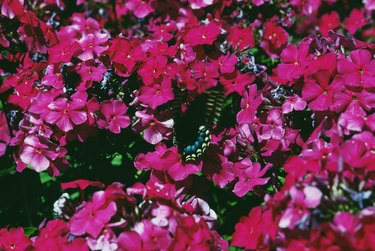
A fuchsia plant full of blooms growing in a container or garden can quickly brighten up a spot. These attractive blossoms, in colors ranging from white to deep magenta and lush purple, are appealing to everyone. Getting your fuchsia plant to be continually loaded with bright, colorful flowers is not as difficult as some think, if you follow a few simple guidelines.
Pruning
Video of the Day
Your fuchsia plant, no matter how big or small, is classified as a bush. This means it has a woody stem and branch structure and that a fuchsia will only develop its blossoms on tender new growth. To keep your fuchsia in bloom, you must promote this new growth by trimming, pruning or even gently pinching back the branches of your fuchsia.
Video of the Day
If you have dramatically pruned back your fuchsia in the fall to only a few inches for its winter dormancy, your fuchsia will begin to grow and produce new stems in the spring. Wait until your fuchsia new growth stems have several leaf pairs on them, then pinch or prune the end of the new growth stem. Be sure to do this at a junction where the leaves meet the stem, as this is the only place your fuchsia can develop new stem growth. By pinching or pruning back the new grow on your fuchsia, you are encouraging your plant to produce more new growth stems which, in turn, will give you a fuller, blooming fuchsia plant. Continue to periodically pinch back new growth stems on your fuchsia throughout its growing season to ensure continued, plentiful blooms.
Dead Heading
The flower heads of fuchsias, as with most plants, produce the plant seed. Once your fuchsia flower has bloomed and begins to die, your fuchsia begins to put its energy and resources into developing and producing the seed pod. This action redirects your plants energy away from developing new flowers. To ensure abundant blossoms on your fuchsia, cut or pinch the dead heads off the main stem as your older blooms die and drop off. Be sure you cut the actual seed pod off your plant. This seed pod is located directly above the flowering head and can be identified as a bulge at the end of the flower stem, just before the flower petals.
By continually dead heading your fuchsia plant during its growing season, you can maintain a high volume of blooming flowers.